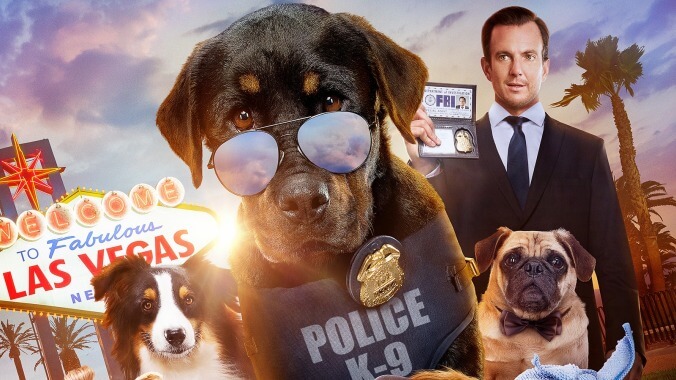At least Show Dogs doesn’t shit on the floor

The live-action talking-pet comedy, which is approximately as old as the sound film, teaches us that there are some cases where you really can’t teach an old dog new tricks. There seem to be hundreds of these things, mostly featuring canines (because they’re relatable and easy to train), yet none of them come within barking distance of the earliest and strangest example of the subgenre, the surreal Dogville series of the late 1920s and early ’30s. (No relation to the Lars von Trier film of the same title—but then, von Trier’s Antichrist did feature a talking fox, so who knows.) It’s not like it’s impossible to make something good or even great with talking dogs in the lead (see: comics, animated films, Miguel de Cervantes’ “The Dialogue Of The Dogs,” etc.); it just seems that when humor depends on getting celebrity voices in sync with cute pooches’ jaws, most other considerations go out the window.
Which brings us to Show Dogs, directed by Raja Gosnell, whose relevant experience includes Beverly Hills Chihuahua
and (to a lesser extent) the two live-action Scooby Doo movies, plus the likes of Big Momma’s House, The Smurfs, and The Smurfs 2. According to Malcolm Gladwell, that should be more than enough to make him a world-class filmmaker. As far as action-comedy-inspired talking-hound fare is concerned, Show Dogs is pretty standard, though less annoying than most. Chris “Ludacris” Bridges voices Max, an NYPD rottweiler who gets partnered up with a bumbling human FBI agent Frank Mosley (Will Arnett) to go undercover at a Las Vegas dog show called the Canini Invitational in order to catch a band of panda smugglers. One shouldn’t dwell on the particular of this plot; the movie doesn’t.
Upon arriving in Vegas, Frank and Max enlist the help of Mattie (Natasha Lyonne), the Bureau’s dog-grooming consultant, and a disgraced champion papillon named Philippe (Stanley Tucci, doing a French accent) in order to pass themselves off as show dog and handler while they try to catch the panda-nappers; additional assistance and screen filler comes by way of a trio of talking pigeons and an over-excitable pug named Sprinkles (Gabriel Iglesias, in his umpteenth small-animal voice role). The whole point of a movie like Show Dogs is to get as many talking dogs (voiced by Alan Cumming, RuPaul, and Shaquille O’Neal, among others) into a scene as possible, which really simplifies the police work, considering that there are only two named human characters in the film who aren’t already on Frank and Max’s side.
Not that the voice cast is given a lot of material to work with—just the requisite pop culture references, jokes about toilet water, and montages of animals being given makeovers and pampered with human luxuries. (The actual dog-show stuff gets short shrift.) That the comedy is second-rate is a given. But at least it’s brisk, inoffensive, and devoid of human mugging, with Arnett breezing through like a pro. That’s a lot more than can be said about the majority of live-action movies in which talking animals are given distinctly human national and ethnic identities. The more important question—at least to those moviegoers who might find themselves buying a ticket to Show Dogs because no amount of begging is going to convince them to take a 6-year-old to Deadpool 2—is whether Show Dogs is actually kind of weird.
It’s true that the movie never addresses the question of whether the humans and dogs are actually speaking to each other—that is, whether the dogs are speaking English, whether it’s more of a Star Wars situation, or whether the humans just hear unintelligible barking in place of the dialogue. The exact mechanics seem to change from scene to scene, though it should be noted that Max appears to be a full-fledged NYPD officer and that dogs are seen freely going about police business at a police station.
It’s also true that Show Dogs features a scene in which Max has a quasi-psychedelic vision while having his testicles inspected by a judge, an action sequence where his digital double fights a human bad guy (though it’s nothing on the order of Bob Clark’s swan song, The Karate Dog), and an epilogue that teases further crime-fighting adventures to an audience that is already indifferently shuffling out of the theater. The offer is unnecessary; there’s nothing about Show Dogs’ premise, characters, or execution that demands a continuation. But in a subgenre defined by its low standards, being unremarkable can be a good thing.